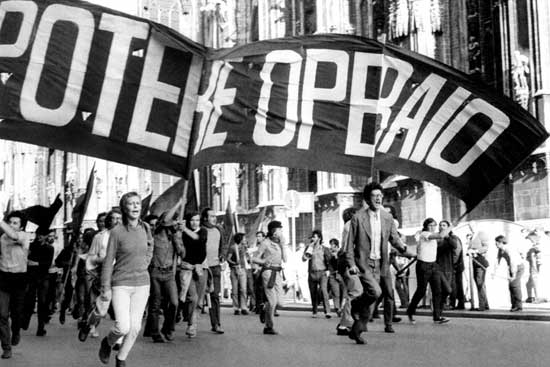In mopping up the year 2018, I almost forgot to mention what might count already as a tradition. “Tradition” because it has ocurred twice, and that almost constitutes a recurring rhythm:
As already happend in 2016, I was invited by a colleague at the University of Leipzig to conduct a session of a seminar on deviance in US literature. Thus, towards the end of the year, I was able to re-visit my postgraduate topic on “cultures of dissent,” and not only talk about it, but also discuss it with a group of interested MA-students.
Differing from 2016, I chose two novels as the background of my discussion: Rachel Kushner’s The Flame Throwers, and Jonathan Lethem’s Dissident Gardens, both from 2013. Together with Omar Robert Hamilton’s 2017 The City Always Wins and Jeff Derksen’s poem The Vestiges, these texts constitute the literary corpus of my (still ongoing?) postdoc-project.
For the seminar, I gave every student a different snippet of the novels plus a list of terms to which they should relate what they had read. Those terms included: Futurism, Potero Operaio, Land Art (for Kushner) or CPUSA, Yippies, and All In The Family (for Lethem). In the class, I put together groups of three to four people and assigned tasks for group work. This worked quite well; the students seemed to like group work, the answers I received were good enough for further discussion; yet my assignment of two novels proved too ambitious.
While I thought that a comparison between two texts might add extra food for thought and a good chance for intellectual cross-pollination, it rather resulted in the participants having to extensively recount what they had read so that the others could relate it to the texts they had read. While this phase of contextualisation was intended, I realised that it took up too much time, and that the method would have been much better with only one novel involved.
Still, we had interesting talks on the role of otherness and othering in the novels, with Kushner dividing her depictions between a 1970s artsy-fartsy USA, where protest and deviance are nullified via their incorporation into a sphere of art and intellectualism, and a worker-powered revoltuous Italy, where people know how to articulate deviance and protest in factories and in the streets. Dualisms, anyone?
With white or blue collar workers completely absent from Kushner’s narrative on the US, I wondered again about contemporary literature’s failure to portray characters steeped in the treat mill of regular working hours. Is this really such a lacunae? It wouldn’t have to be about class relations specifically, or Marxist approaches to exploitation, but simply the depiction of people whose life is governed basically by their working schedule. Is that really missing in favour of oddballs, artists or outsiders? And it’s not that a novel had to concentrate on the mundane tasks of a secretary or delivery worker; but are there any secretaries and delivery workers as characters in US lit?
On Lethem, the students’ discussions focussed on the depictions of family structures as the gamete of revolutionary evolution, ie. the role an upbringing in deviant families plays for a (romanticised) portrayal of US history as a history of deviance. While Lethem’s Communist Party-affiliate family, the Zimmers, struggles with different oppressive regimes through three generations and attempts in various ways to make the US (and the world) a better place by supporting progressive causes, Lethem’s leaning on strong female characters puts his novel in an animated conversation with that of Kushner: Students argued that Kushner’s lead is basically portrayed as a weak, dependent woman, serving basically as a screen for other characters’ and the readers projections about the era, about political topics and about gender notions.
That made the hype about The Flame Throwers being “the great American novel written and narrated by a woman,” which some reviewers started, all the more suspicious. It does not surprise me that Lethem’s book on a Communist family with exceptionally strong (albeit ambiguous and far from perfect) female characters did not catch the reviewers’ attention to the extent that Kushner’s (arguably well-crafted, inspired and historically interesting) novel did.
All in all, a good seminar, and a great way to remind myself that I’m potentially still working on my second book. Let’s see what 2019 brings!

